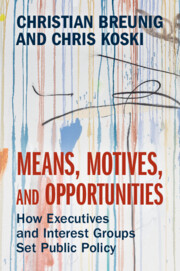
- Cited by 1
-
Cited byCrossref Citations
This Book has been cited by the following publications. This list is generated based on data provided by Crossref.
Breunig, Christian and Klüser, K. Jonathan 2024. Venue‐Making. Governance,
- Publisher:
- Cambridge University Press
- Online publication date:
- April 2024
- Print publication year:
- 2024
- Online ISBN:
- 9781009428583


